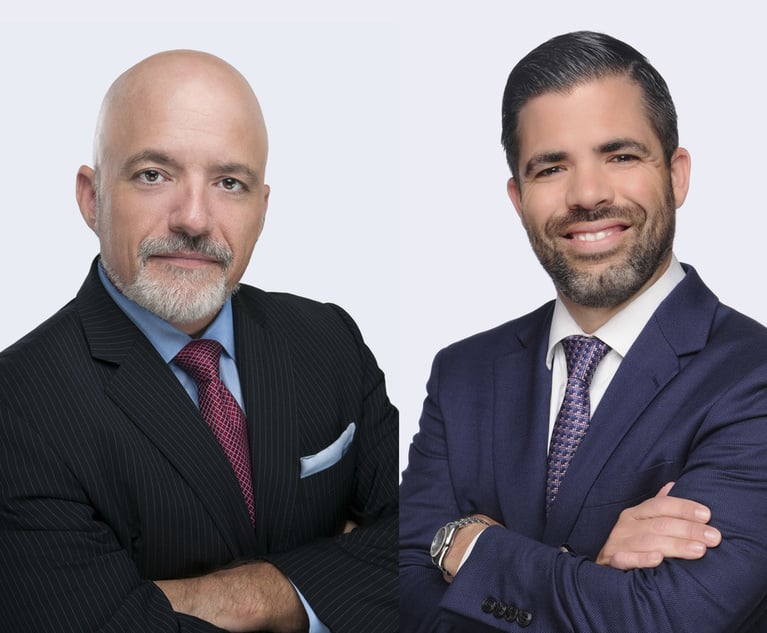No Expectation of Privacy for Employee's Flash Drive Attached to Work Computer
Can an employee bring a claim against an employer if the employer bases an employment-related decision on information obtained from a personal data storage device?
August 07, 2019 at 10:09 AM
4 minute read
 Aldo Leiva, Of counsel, Baker Donelson, Fort Lauderdale, and Jonathan Hancock, Shareholder, Baker Donelson, Memphis
Aldo Leiva, Of counsel, Baker Donelson, Fort Lauderdale, and Jonathan Hancock, Shareholder, Baker Donelson, Memphis
Can an employee bring a claim against an employer if the employer bases an employment-related decision on information obtained from a personal data storage device? On June 26, the Florida Third District Court of Appeals answered that question by holding that a former police employee had no reasonable expectation of privacy in a personal flash drive that was plugged in to her work computer. The employee had been convicted of official misconduct for falsifying police reports in an effort to get her husband fired from his job. On appeal, the employee argued that the trial court had erred in admitting the evidence obtained from her flash drive because the drive was her personal property, and she otherwise normally kept it in her possession. In rejecting the argument, the appellate court identified several factors that established that the employee had no expectation of privacy in the contents of the flash drive:
- The employee shared an office with a co-worker who had access to the employee’s computer at all times because the employee left a sticky note with her computer password on her desk for that purpose;
- The work computer contained a login banner that clearly warned users about the police department’s computer policy, which included language confirming that the computer was for authorized use only and that all uses of the computer system were subject to monitoring, recording, copying or auditing, followed by an acknowledgement of consent to use of the computer under these conditions;
- The employer had a protocol that anything attached to the work computer, including external media, such as a flash drive, is deemed to be part of the employer’s computer system; and
- The employee had left the flash drive plugged in to her work computer, which was seized along with the computer as part of an internal investigation into the allegations.
Although issued within the context of an official misconduct case, the decision reinforces Florida case law on the subject of limits on employee privacy and emphasizes the key role of employer privacy policies and employee acknowledgements of such policies. In addition to serving as an administrative safeguard to mitigate against such risks as employee theft, misconduct and violation of any applicable noncompetition agreement, clear delineation of such policies are useful in any subsequent litigation involving the employee, where privacy rights may be raised by the employee for various tactical reasons.
The facts of the case also serve as a reminder to employers to think about what their policies and practices allow or prohibit, and to consider instituting proper controls to manage the use of flash drives on workplace computers, as such devices may be used to download employer data, contacts or trade secrets. From the employment litigation perspective, an early comprehensive litigation hold letter may include specific reference to any flash drives or similar portable media that are connected to employer computer networks at the time the hold letter is issued, with a clear prohibition on removal of any such devices that have been connected to the employer’s computer network as of the time of the litigation hold letter. But as the Florida court demonstrated, an employee’s claim to privacy may be rendered unreasonable when clearly communicated policies and related notices undermine the reasonableness of that employee’s expectation of privacy. Does this holding apply to an employee’s public social media posts or to emails sent and received on a personal email address? These questions and others like them all warrant a closer look at how this information is addressed by an employer, as waiting until there is an issue will likely mean the company is unprepared to address it.
Aldo M. Leiva is of counsel with Baker Donelson in Fort Lauderdale. He advises clients on compliance with rapidly evolving federal, state, and international data security and privacy laws, as well as handles complex business litigation matters. He can be reached at [email protected].
Jonathan Hancock is a shareholder in the firm’s Memphis office. He represents employers and management clients as they address all aspects of employment law and litigation, including employee counseling and termination, proactive employee training, and the handling of employee complaints and claims in state or federal courts across the country. He can be reached at [email protected].
This content has been archived. It is available through our partners, LexisNexis® and Bloomberg Law.
To view this content, please continue to their sites.
Not a Lexis Subscriber?
Subscribe Now
Not a Bloomberg Law Subscriber?
Subscribe Now
NOT FOR REPRINT
© 2025 ALM Global, LLC, All Rights Reserved. Request academic re-use from www.copyright.com. All other uses, submit a request to [email protected]. For more information visit Asset & Logo Licensing.
You Might Like
View All
Trending Issues in Florida Construction Law That Attorneys Need to Be Aware Of
6 minute read


Trending Stories
- 1Justice Department Sues to Block $14 Billion Juniper Buyout by Hewlett Packard Enterprise
- 2A Texas Lawyer Just Rose to the Trump Administration
- 3Hogan Lovells Hires White & Case Corporate and Finance Team in Italy
- 4New York District Attorneys Endorse Governor's Proposed Rollback of Discovery Reforms
- 5Greenberg Traurig Launches Munich Office with Eight Hires, Including McDermott Group
Who Got The Work
J. Brugh Lower of Gibbons has entered an appearance for industrial equipment supplier Devco Corporation in a pending trademark infringement lawsuit. The suit, accusing the defendant of selling knock-off Graco products, was filed Dec. 18 in New Jersey District Court by Rivkin Radler on behalf of Graco Inc. and Graco Minnesota. The case, assigned to U.S. District Judge Zahid N. Quraishi, is 3:24-cv-11294, Graco Inc. et al v. Devco Corporation.
Who Got The Work
Rebecca Maller-Stein and Kent A. Yalowitz of Arnold & Porter Kaye Scholer have entered their appearances for Hanaco Venture Capital and its executives, Lior Prosor and David Frankel, in a pending securities lawsuit. The action, filed on Dec. 24 in New York Southern District Court by Zell, Aron & Co. on behalf of Goldeneye Advisors, accuses the defendants of negligently and fraudulently managing the plaintiff's $1 million investment. The case, assigned to U.S. District Judge Vernon S. Broderick, is 1:24-cv-09918, Goldeneye Advisors, LLC v. Hanaco Venture Capital, Ltd. et al.
Who Got The Work
Attorneys from A&O Shearman has stepped in as defense counsel for Toronto-Dominion Bank and other defendants in a pending securities class action. The suit, filed Dec. 11 in New York Southern District Court by Bleichmar Fonti & Auld, accuses the defendants of concealing the bank's 'pervasive' deficiencies in regards to its compliance with the Bank Secrecy Act and the quality of its anti-money laundering controls. The case, assigned to U.S. District Judge Arun Subramanian, is 1:24-cv-09445, Gonzalez v. The Toronto-Dominion Bank et al.
Who Got The Work
Crown Castle International, a Pennsylvania company providing shared communications infrastructure, has turned to Luke D. Wolf of Gordon Rees Scully Mansukhani to fend off a pending breach-of-contract lawsuit. The court action, filed Nov. 25 in Michigan Eastern District Court by Hooper Hathaway PC on behalf of The Town Residences LLC, accuses Crown Castle of failing to transfer approximately $30,000 in utility payments from T-Mobile in breach of a roof-top lease and assignment agreement. The case, assigned to U.S. District Judge Susan K. Declercq, is 2:24-cv-13131, The Town Residences LLC v. T-Mobile US, Inc. et al.
Who Got The Work
Wilfred P. Coronato and Daniel M. Schwartz of McCarter & English have stepped in as defense counsel to Electrolux Home Products Inc. in a pending product liability lawsuit. The court action, filed Nov. 26 in New York Eastern District Court by Poulos Lopiccolo PC and Nagel Rice LLP on behalf of David Stern, alleges that the defendant's refrigerators’ drawers and shelving repeatedly break and fall apart within months after purchase. The case, assigned to U.S. District Judge Joan M. Azrack, is 2:24-cv-08204, Stern v. Electrolux Home Products, Inc.
Featured Firms
Law Offices of Gary Martin Hays & Associates, P.C.
(470) 294-1674
Law Offices of Mark E. Salomone
(857) 444-6468
Smith & Hassler
(713) 739-1250






